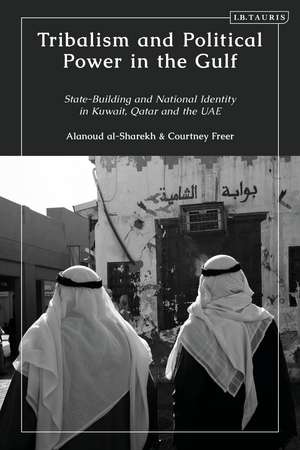Tribalism and Political Power in the Gulf: State-Building and National Identity in Kuwait, Qatar and the UAE
Autor Courtney Freer, Alanoud al-Sharekhen Limba Engleză Paperback – 31 mai 2023
| Toate formatele și edițiile | Preț | Express |
|---|---|---|
| Paperback (1) | 149.90 lei 3-5 săpt. | +60.99 lei 6-10 zile |
| Bloomsbury Publishing – 31 mai 2023 | 149.90 lei 3-5 săpt. | +60.99 lei 6-10 zile |
| Hardback (1) | 569.06 lei 6-8 săpt. | |
| Bloomsbury Publishing – 20 oct 2021 | 569.06 lei 6-8 săpt. |
Preț: 149.90 lei
Preț vechi: 191.71 lei
-22% Nou
Puncte Express: 225
Preț estimativ în valută:
28.69€ • 31.15$ • 24.10£
28.69€ • 31.15$ • 24.10£
Carte disponibilă
Livrare economică 02-16 aprilie
Livrare express 18-22 martie pentru 70.98 lei
Preluare comenzi: 021 569.72.76
Specificații
ISBN-13: 9780755644896
ISBN-10: 0755644891
Pagini: 224
Dimensiuni: 156 x 234 x 25 mm
Greutate: 0.5 kg
Editura: Bloomsbury Publishing
Colecția I.B.Tauris
Locul publicării:London, United Kingdom
ISBN-10: 0755644891
Pagini: 224
Dimensiuni: 156 x 234 x 25 mm
Greutate: 0.5 kg
Editura: Bloomsbury Publishing
Colecția I.B.Tauris
Locul publicării:London, United Kingdom
Caracteristici
Relevant to scholars of Middle East Studies, Gulf Studies, Political Science, History, and Anthropology
Notă biografică
Alanoud al-Sharekh is the Director of Ibtkar Strategic Consultancy leading political, leadership and diversity training programs in Kuwait and the GCC region. She is chairperson of the Chaillot award winning Abolish 153 campaign to end honor killing legislations, and a cofounder of Mudhawis List, a platform to support women running for political office. Her research won the Arab Prize for best publication in a foreign journal in 2014, and includes books such as The Gulf Family, and Popular and Political Cultures of the Arabian Gulf States, examining the persistent importance of family and tribe in modern Gulf politics and society. She is currently a MENA Fellow at Chatham House and a Research Fellow at AGISW.Courtney Freer is Assistant Research Fellow at the Middle East Centre at the London School of Economics and Political Science. She is the author of Rentier Islamism: The Influence of the Muslim Brotherhood in Gulf Monarchies (2018)..
Cuprins
Table of ContentsChapter One: IntroductionChapter Two: The Historical Relationship between Badu and MonarchiesChapter Three: Heritage Production and Branding of the Modern Badu in State FormationChapter Four: The Social Evolution of the TribeChapter Five: Tribalisation of traditionally non-tribal actors and future impact of the resurgence of tribal rhetoric Chapter Six: Electoral TribalismChapter Seven: Tribal Intersections in the Digital AgeChapter Eight: Conclusion
Recenzii
Insightfully ... the book presents a historical, conceptual and digital understanding of tribal mechanisms in these states and represents an outstanding contribution to Gulf studies.
This book is essential for a meaningful understanding of the prevailing political, social and economic conditions of the countries of the Gulf Cooperation Council. An admirable contribution to the literature that will stand the test of time.
A richly nuanced study of the changing relations of tribe and state in the Arabian Peninsula. The authors pose a fresh challenge to the prominent notion that the rentier state has significantly limited the role of independent actors, and especially tribes, in contributing to national identity formation in the Gulf region. A most welcome contribution that will attract the interest of scholars working across the social sciences.
Concentrating on the impact of tribes in the three Gulf states with high income and small national populations, Freer and Alsharekh ably explain tribal importance in badu identity, electoral politics, and their continuing sociopolitical role
This book is essential for a meaningful understanding of the prevailing political, social and economic conditions of the countries of the Gulf Cooperation Council. An admirable contribution to the literature that will stand the test of time.
A richly nuanced study of the changing relations of tribe and state in the Arabian Peninsula. The authors pose a fresh challenge to the prominent notion that the rentier state has significantly limited the role of independent actors, and especially tribes, in contributing to national identity formation in the Gulf region. A most welcome contribution that will attract the interest of scholars working across the social sciences.
Concentrating on the impact of tribes in the three Gulf states with high income and small national populations, Freer and Alsharekh ably explain tribal importance in badu identity, electoral politics, and their continuing sociopolitical role
